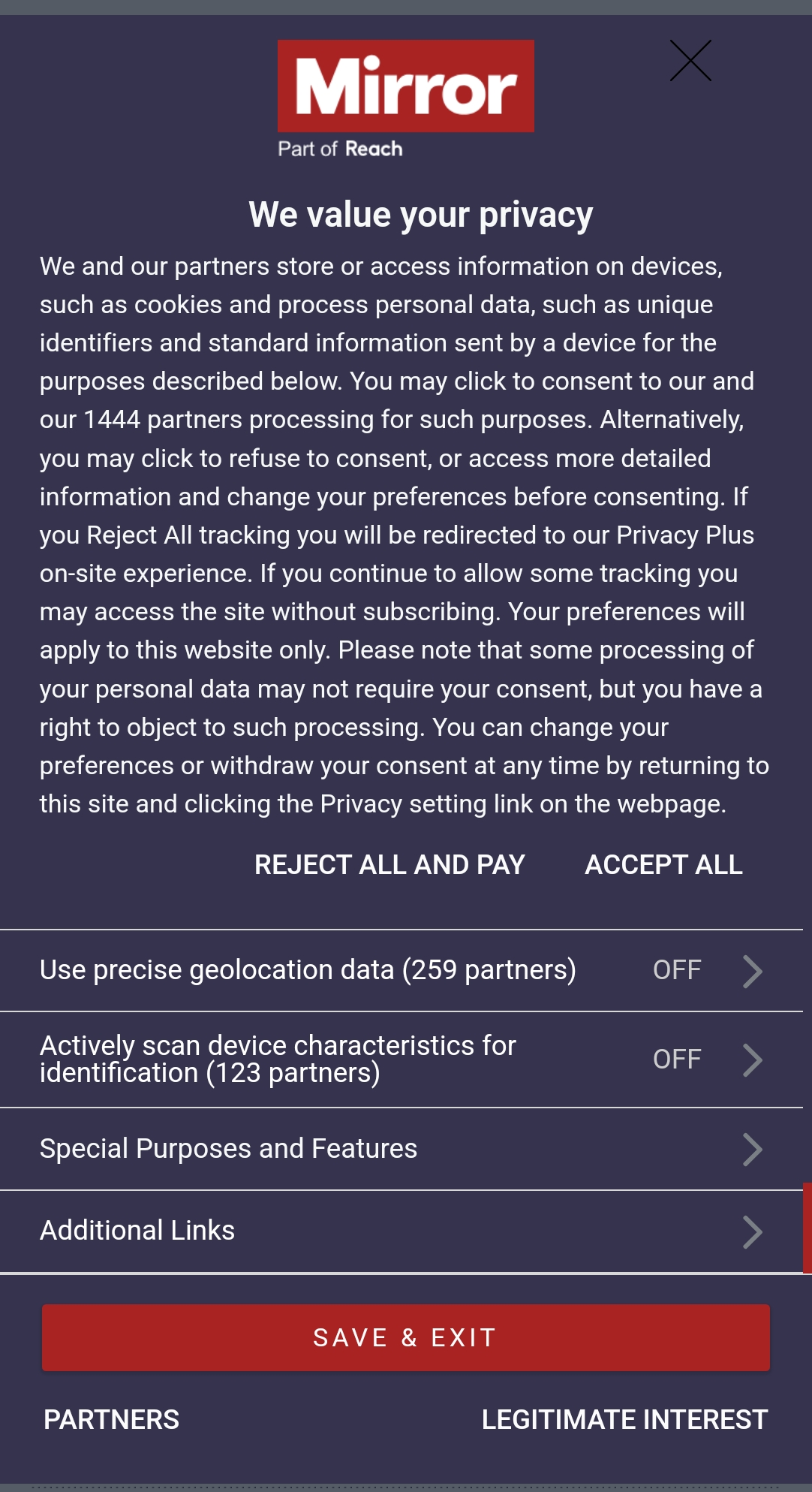
Not sure how long this has been a thing but I was surprised to see that you cannot view the content without either agreeing to all or paying to reject.

Not sure how long this has been a thing but I was surprised to see that you cannot view the content without either agreeing to all or paying to reject.
A common thing in continental Europe too. NOYB and some EU lawmakers are trying to make these pay-or-ok schemes illegal, but I guess in the UK you will be out of luck regarding that.
Wouldn’t this be blatantly in conflict with the EU cookie law? Like I’m not from Europe but my understanding was that it needs to be equally easy to accept or reject all cookies. Dark patterns aren’t allowed
Currently it’s a grey area I think
It’s not a grey area, it’s clearly illegal (consent has to be given voluntarily. If you can’t use the site without paying, that’s not voluntary). Agencies so far just decided to look the other way and play dumb. There are lawsuits ongoing.
UK is not EU, so EU law does not apply.
Person I’m responding to said this was common in continental Europe
I’ll call bullshit on that until examples given…
www.spiegel.de www.faz.net www.sueddeutsche.de www.heise.de www.golem.de www.derstandard.at www.repubblica.it/
I don’t think you understand what we are talking about here regarding the Mirror.
You called bullshit on it being common on the continent, I provided examples from the continent.
Just those aren’t examples of what the mirror website is doing. You didn’t get the point.
I’ve never seen one of these before
i think this one might, actually. When the EU passes a law like this, each member state passes it into their own national law, and so if these cookies laws were implemented before the UK left the EU they’d likely still be there
It’s more than that. The EU law lets any EU citizen report a company that’s not in compliance. That includes companies not strictly in the EU. It’s why even US companies tend to be in compliance (or something like compliance).
If their product is accessible from within the EU, they have to implement the proper rules. That’s why many of the minor / weird news sites aren’t accessible from the EU anymore without VPN. Which I consider a win for EU citizens.
It’s even broader. An EU citizen living anywhere accessing any site can report that site. It may be that the EU won’t be able to collect the fine–assuming the owners never travel to the EU–but they can be fined.
The GDPR was enacted in 2016 and came into effect in 2018. The UK left the EU in 2020.
But UK laws do, which share a lot of commonality - like the GDPR
https://www.edpb.europa.eu/news/news/2024/edpb-consent-or-pay-models-should-offer-real-choice_en
I think this type of scheme is illegal under the GDPR, which is in effect in the UK just as it is in the EU.
It’s been a while since I worked with the GDPR, but from memory the wording is such that:
The data holder needs to allow people to opt out of data collection. The subject can request to be forgotten. The data holder explicitly cannot charge for this.
But changes move slow, and The Mirror is probably banking on nobody caring enough to complain, and Trading Standards being too underfunded and swamped with other work to investigate otherwise (which they are). If they’re challenged, they’ll just change tack, go “oops” and are unlikely to hit big fines unless they dig in.
Cookie laws are a horrible mess and always have done - the resulting consent banners are far more intrusive than anyone wanted.
The EU is now fighting such schemes though.
That’s doubtful - you have examples? Because if the service is based in the EU I’ll send those to the appropriate agency today.
In Spain too, try marca.com, abc.es or el pais.es.
Like basically every German news outlet? And this is already being contested in courts as some German data protection agencies (falsely IMHO) ruled this as valid.